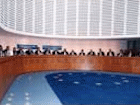


In Schalk & Kopf v. Austria (Application No. 30141/04) the First Section of the Court (which includes the Austrian judge) has scheduled an oral hearing on the admissibility and merits of the application for Thursday, 14 January 2010 at 9:00 am, before a 7-judge Chamber of the Court (which has 47 judges, one per Council of Europe member state). Hearings are now exceptional, because of the Court's heavy caseload, so this indicates the importance of the case.
Mr. Horst SCHALK & Mr. Johann KOPF were denied permission to marry in Vienna in Dec. 2002. Their subsequent legal challenge was rejected by the Austrian Constitutional Court (Verfassungsgerichtshof) on 12 Dec. 2003. The applicants submitted an application on their behalf to the Eur Ct HR, which was communicated to the Austrian Government in Jan. 2007. The Eur Ct HR asked the Government to respond to the following questions:
"1. Have the applicants suffered discrimination in the enjoyment of their Convention rights on the ground of their sexual orientation, contrary to Article 14 of the [European] Convention [on Human Rights] read in conjunction with Article 8 [which includes the right to respect for private and family life]? In particular, should they be afforded a possibility of having their relationship recognised by law. [Although same-sex couples in Austria now enjoy the same, extensive rights as unmarried different-sex couples, as a result of Siegmund KARNER v. Austria, Eur Ct HR, 24 July 2003, they do not enjoy all the rights of married different-sex couples, and they have no access to an alternative registration system.]
2. Has there been a violation of the applicant's right to marry, contrary to Article 12 of the Convention?"
On 26 June 2007, on behalf of the FIDH (Fédération Internationale des ligues des Droits de l'Homme) in Paris, the ICJ (International Commission of Jurists) in Geneva, the AIRE Centre (Advice on Individual Rights in Europe) in London, and ILGA-Europe (European Region of the International Lesbian, Gay, Bisexual, Trans and Intersex Association) in Brussels, ECSOL-member Robert Wintemute submitted Written Comments (a third-party intervention or amicus curiae brief) and will now request leave to take part in the hearing on behalf of the above-mentioned third parties. This hearing will be the first the Court has held that deals with equal access to legal marriage for a same-sex couple, as opposed to a different-sex couple (in which one partner is transsexual and has undergone gender reassignment).